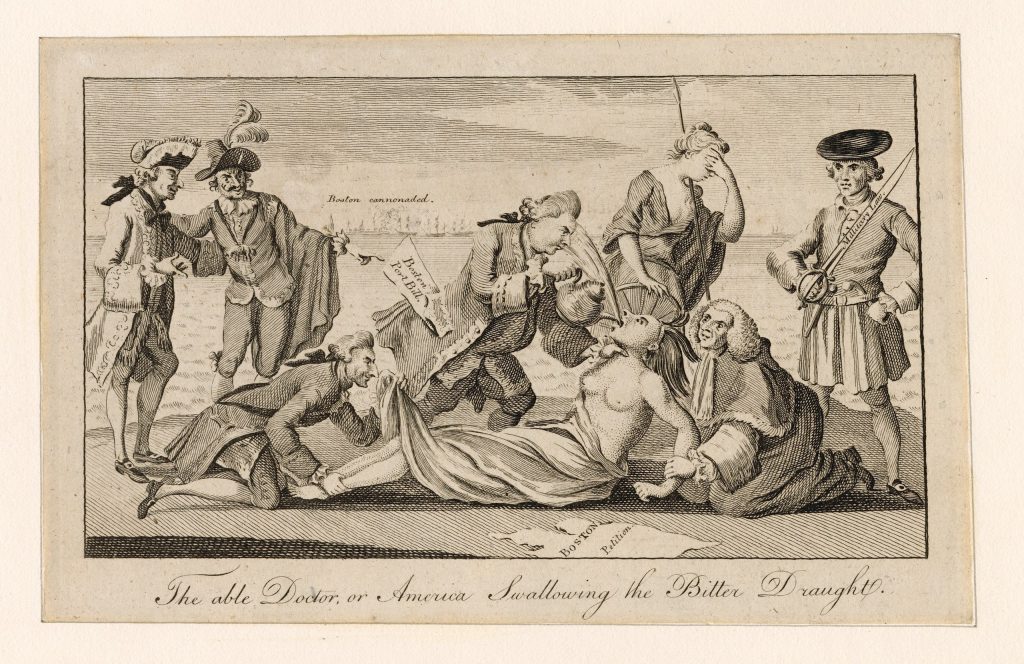
Edward A. St. Germain created AmericanRevolution.org in 1996. He was an avid historian with a keen interest in the Revolutionary War and American culture and society in the 18th century. On this website, he created and collated a huge collection of articles, images, and other media pertaining to the American Revolution. Edward was also a Vietnam veteran, and his investigative skills led to a career as a private detective in later life.
The Intolerable Acts, also known as the Coercive Acts, were a series of controversial laws passed in the Thirteen Colonies in America by the British parliament.
In this guide, we’ve explained what the Intolerable Acts did, and how colonists reacted to the new laws. We’ve also provided some interesting facts you may not know about the Intolerable Acts.
Prior to the beginning of the American Revolution in April 1775, tensions between the British government and the residents of the Thirteen Colonies were on the rise.
In 1773, the British government implemented the Tea Act, which gave the British East India Company a virtual monopoly on the tea trade in the colonies.
The act made it difficult for colonial merchants to make a profit, especially those who smuggled in tea from other countries, such as Holland.
When the colonists purchased British tea, they had to pay the British government a tax under the Townshend Acts, which outraged Patriot political leaders. Many colonists thought that the British had no right to tax them without their consent.
As a result, there was widespread backlash against the Tea Act. British tea shipments were sent back to Britain or held in port, and left to rot. There were widespread protests, especially in Boston, and some merchants organized trade boycotts of British goods.
On December 16, 1773, members of the Sons of Liberty boarded a British ship docked in Boston Harbor, and dumped 342 chests of tea into the sea, worth more than $1m in today’s money.
British politicians were outraged by the colonists’ rebellion. To punish the colonies, they implemented four new laws in 1774, known as the Coercive Acts.
The Americans labeled these laws the “Intolerable Acts” – Patriots considered this a massive overreach by the British government.

The main effect of the Intolerable Acts was to unify the colonists against the British and convince more people to switch from the Loyalist to the Patriot side.
In Boston, the port closure was a big blow to the Massachusetts economy. Merchants could no longer import goods to sell, meaning there were shortages of essential products such as coal, rice, and textiles. As a result, domestic manufacturing in many colonies increased. Port workers had no work to do, and colonial traders could no longer export goods such as timber, rum, and cod overseas.
The Coercive Acts convinced politicians that they needed to respond to British overreach. They signaled that the British were unwilling to try and come to a peaceful resolution to the conflict – instead, further escalation was on the horizon.
From September 5 to October 26, 1774, the First Continental Congress was held in Philadelphia. Representatives from twelve of the Thirteen Colonies met to decide how to respond to what the British were doing.
The delegates drew up a petition to King George III of England, asking for the Coercive Acts to be repealed, and for a peaceful resolution to the conflict, which was ignored. They also agreed to implement a complete boycott of British imports, to hurt the British financially.
After the Intolerable Acts, some Patriots also began preparing for possible military conflict, and to protect themselves from British tyranny. Militia groups began to form in larger numbers, and people began stockpiling weapons and ammunition.
Crucially, the Intolerable Acts were one of the major factors that pushed North America towards war. Without the escalation in tension that the acts caused, it is possible that the Revolutionary War might not have happened.
![]()
Read the diary of Charles Herbet, a Continental soldier that was captured by the British Army and sent to a prison of war camp in the UK.
Read the fascinating journals of Captain John Paul Jones' heroics during the American Revolution, written in 1785.
![]()
Read entries from 1781 in the journal of James Thatcher, Continental Army surgeon during the American Revolution.